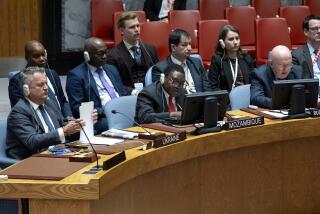U.S. Regains Seat on Rights Panel
UNITED NATIONS — The United States regained a seat on the U.N. Human Rights Commission on Monday, a year after a humiliating ouster from the panel it helped create more than 50 years ago.
A surprise upset in elections last May for the commission sidelined the United States, while governments with poor human rights records such as Sudan and Uganda won seats on the body designed to monitor international human rights abuses. The defeat had more to do with disorganization in the way candidates were chosen than with the world’s disenchantment with an increasingly isolated U.S. government. But at a time when it needed more than ever to be seen as a global leader, the Bush administration launched a yearlong lobbying effort to reclaim a place at the table.
This year, there were no surprises for the 53-member commission, which is composed of representatives from five regional groups. The winners were decided long before the election, as the Western countries’ group followed other regions’ example, and put forward only four candidates for the four seats set aside for Western nations. In an elaborate deal brokered by Iceland’s ambassador, Italy and Spain dropped out of the race in March to clear the way for the United States. Australia, Germany and Ireland will hold the other three positions.
There won’t be much suspense in the future, either. The Western group has agreed to rotate the seats among its members, with the U.S. and Canada to be perennial seat-holders, taking an occasional breather.
“Human rights is a cornerstone of U.S. foreign policy,” said the U.S. ambassador to the commission, Sichan Siv. “We have spoken, and we continue to speak on the issue, whether we are on the commission or not. But now that we are back on the commission, we look forward very much to working to continue to promote this very important issue,” Siv said Monday after the results were announced.
For the past year, U.S. diplomats have been able to observe at the commission, but not to vote or introduce resolutions. But even with the U.S. restored to full participation, the commission is leaning even further away from enforcing American-style human rights ideals, say critics.
“The U.S. got what it wanted--an unopposed seat,” said Joanna Weschler, the U.N. representative of Human Rights Watch, an independent watchdog group. “The big question is what it will do with it. The United States has to help get the commission back into the business of naming and shaming. Otherwise, whether the United States is a member or not, the commission is going to sink into irrelevance.”
Though the parent body, the U.N. Economic and Social Council, is supposed to elect the members, the regions tend to decide the seat-holders among themselves, reducing the election to more of an affirmation of prearranged results. This year, three of the five groups preselected their winners.
That means more governments with sketchy human rights practices are gaining seats on the commission and are able to deflect criticism of their countries or allies, said David M. Malone, president of the International Peace Academy, an independent think tank. “Human rights violators increasingly seem to dominate the composition of the commission and have been able to sharply limit the focus on individual countries.”
At the recent Human Rights Commission session in Geneva, the group declined to discuss reported repression in China, tempered criticism of Russian abuses in Chechnya and agreed to end human rights investigations in Iran.
On Monday, the African group put forth Zimbabwe, which has a questionable human rights record, as one of four uncontested countries to represent the continent, along with Burkina Faso, Gabon and Swaziland. The choice of Zimbabwe caused concern that “abusers’ solidarity” will gather force. “Governments need to make a country’s human rights record a key factor in selecting countries to the commission,” said Weschler. “This is what matters.”
*
The Election
*
About one-third of the 53-member group is elected each year for a three-year term.
*African group: Burkina Faso, Gabon, Swaziland, Zimbabwe
Asian group: China, Japan, Sri Lanka
Eastern European group: Ukraine
*Latin American group: Argentina, Brazil, Paraguay
*Western European and Others group: Australia, Germany, United States and Ireland
*uncontested
More to Read
Sign up for Essential California
The most important California stories and recommendations in your inbox every morning.
You may occasionally receive promotional content from the Los Angeles Times.









